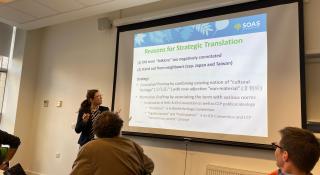
Breadcrumbs navigation
Review of International Studies Best Article Prize in discussion: Returning to the root
Last week we announced an honourable mention for David Duriesmith and Sara Meger in the Review of International Studies Best Article Prize for ‘Returning to the root: Radical feminist thought and feminist theories of International Relations’ (vol. 46, no. 3). Here they discuss the article, what led up to it and what's next for each of them, with Review of International Studies (RIS) editor Martin Coward.
The RIS Best Article Prize is awarded annually by the editorial advisory board of our journal . It’s awarded for the best article published in the previous year's volume of the journal. This year's winner was José Ciro Martínez for ‘Topological twists in the Syrian conflict: Re-thinking space through bread’ (Vol 46, no1).
The judges were also extremely impressed by David and Sara's article, 'Returning to the root'. They said:
“Duriesmith and Meger excavate rich resources for theorizing sex, the state, and the international system by raising the ghosts of radical feminist thought underpinning feminist international relations. They recalibrate foundational works moving IR beyond the received standards and usual suspects.”
Cambridge University Press has agreed to make ’Returning to the root: Radical feminist thought and feminist theories of International Relations’ free to access for a whole year so please do click through to read it.
DOI: https://doi.org/10.1017/S0260210520000133
Abstract
Feminist International Relations (IR) theory is haunted by a radical feminist ghost. From Enloe's suggestion that the personal is both political and international, often seen as the foundation of feminist IR, feminist IR scholarship has been built on the intellectual contributions of a body of theory it has long left for dead. Though Enloe's sentiment directly references the Hanisch's radical feminist rallying call, there is little direct engagement with the radical feminist thinkers who popularised the sentiment in IR. Rather, since its inception, the field has been built on radical feminist thought it has left for dead. This has left feminist IR troubled by its radical feminist roots and the conceptual baggage that feminist IR has unreflectively carried from second-wave feminism into its contemporary scholarship. By returning to the roots of radical feminism we believe IR can gain valuable insights regarding the system of sex-class oppression, the central role of heterosexuality in maintaining this system, and the feminist case for revolutionary political action in order to dismantle it.
Photo by Jen Theodore on Unsplash


